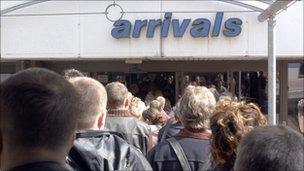Migration: Council fears 'serious difficulty' from Romanian and Bulgarian changes
- Published

One of London's largest councils says it will be in "serious difficulty" if it does not plan for the arrival of more Romanian and Bulgarian migrants.
Philippa Roe, Conservative leader of Westminster City Council, said the end of work restrictions on migrants next year was likely to have a big impact.
Most incomers would be "low-skilled" and the council must anticipate "the costs of looking after these people".
Diplomats for the two countries have played down the likely impact.
The end of restrictions on what work Romanians and Bulgarians migrants can do in the UK, in force since the two countries joined the EU in 2007, have triggered a fierce political debate.
'Tip of the iceberg'
Giving evidence to a parliamentary committee, Ms Roe said migration from Romania was already having "quite an impact" on her borough, suggesting there had been an increase in the number of people sleeping rough around Marble Arch and a rise in low-level crime in the area.
This, she told the Commons Public Administration Committee, was only the "tip of the iceberg".
"It started with the Olympics when they felt this was a massive opportunity to make a bit of money and now summer is coming again and they are back again."
Half the borough's population was already born outside the UK, she said, and an anticipated "influx" of people from Romania and Bulgaria next year would have a major effect on the supply of housing, healthcare and other services.
"If we do not plan for that, we are going to be in serious difficulty," she said. "The implications are serious if we get it wrong."
She added: "There are people who are economically going to contribute but mostly in lower-skilled jobs, Therefore, over time, there may be costs as a local authority in looking after these people and we need to get a real handle on what that is likely to be."
An immigration expert told the committee that the government should have more accurate information about the likely number of arrivals than it had had in 2004, when Poland, the Czech Republic and eight other countries joined the EU.
Prof John Salt, co-director of the migration research unit at University College London, said population flows could be better anticipated now and he expected there was "some file" sitting in a desk in Whitehall providing an estimate.
"It may not have been published, but I can't believe a calculation has not been made," he told MPs.
'Blunt instrument'
Ministers say accurate predictions cannot be given, since seven other countries are also ending their transitional controls at the same time.
But the Bulgarian and Romanian authorities have said they expect a maximum of 35,000 people to come to the UK next year.
Speaking on Tuesday, the Romanian ambassador to the UK said many of those already here were doing jobs that could not be filled by British nationals and that the Olympic Stadium could not have been built without the input of Romanian workers.
The Conservatives have pledged to reduce net migration - the difference between the number of people leaving the country permanently every year and those arriving - from more than 200,000 during the last government to less than 100,000.
Ms Roe said net migration was a "blunt instrument" and there was a "lack of public understanding" about what it meant. The public believed people were counted when they entered the UK when this was not case, she added, and the UK should move towards a comprehensive e-borders system.
Population register
Prof Salt said statistics could never be truly accurate due to their complexity, suggesting the only two countries that had a complete picture of who was living there were Australia - which had entry and exit checks - and North Korea "who we do not want to emulate".
He called for a feasibility study to be carried out into setting up a population register, although he acknowledged that this might be "politically impossible" due to the legacy of opposition to the identity cards.
Conservative MP Bernard Jenkin, who chairs the committee, said the margins for error in the current calculation of migration statistics were too great and, as a result, the benchmarks used by government may potentially be misleading.
At the moment, he said it was possible for the government to claim it was meeting its target when it actually was "miles off" and, in contrast, ministers could introduce "draconian" policies in pursuit of a target that had already been met.
- Published23 April 2013
- Published14 May 2014
- Published21 April 2013